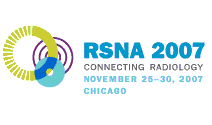
Abstract Archives of the RSNA, 2007
Luca Saba MD, Presenter: Nothing to Disclose
Roberto Montisci MD, Abstract Co-Author: Nothing to Disclose
Roberto Sanfilippo MD, Abstract Co-Author: Nothing to Disclose
Giancarlo Caddeo MD, Abstract Co-Author: Nothing to Disclose
Giorgio Mallarini MD, Abstract Co-Author: Nothing to Disclose
Vulnerable plaques may determine stroke. Our purpose was to evaluate the agreement between US-ECD and multi-detector-row CT angiography (MDCTA) in evaluation of vulnerable plaque.
We evaluated retrospectively 250 patients (164 males, 86 females) that underwent both multi-detector-row CT Angiography and US-ECD evaluation for the study of carotid arteries from January 2004 to January 2007. In each patient the following features were studied: plaque morphology (regular versus irregular) the type of the plaque (fatty, mixed and calcified), presence of ulcerations, presence of thrombosis. Then we compared data derived form MDCTA and US-ECD in order to calculate the agreement and the kappa value.
In the definition of the type of plaque number of observed agreements was 77.6 % and the kappa value was 0.664 (95% Confidence Interval : 0.609- 0.719). The weighted kappa resulted 0.681. In the definition of ulceration plaque number of observed agreements was 74 % but the kappa value was only 0.298 (95% Confidence Interval: 0.151 - 0.445). Agreement observed in the evaluation of plaque morphology was 76.4% with a kappa value of 0.525 (95% Confidence Interval: 0.421 - 0.632).
We observed a good agreement between US-ECD and MDCTA in the evaluation of plaque type but a poor agreement in the evaluation of plaque ulceration. The use of US-ECD and MDCTA produces different results in the evaluation of plaque and confirm previous observations that indicate the only US-ECD as insufficient procedure to classify pathologic carotid artery.
The agreement between MDCTA and US in the analysis of carotid plaque is poor.This data suggest that information derived from US should be always critically compared with other diagnostic techniques.
Saba, L,
Montisci, R,
Sanfilippo, R,
Caddeo, G,
Mallarini, G,
Vulnerable Plaque: Detection of Agreement between Multidetector Row CT Angiography and US-ECD. Radiological Society of North America 2007 Scientific Assembly and Annual Meeting, November 25 - November 30, 2007 ,Chicago IL.
http://archive.rsna.org/2007/5009022.html

